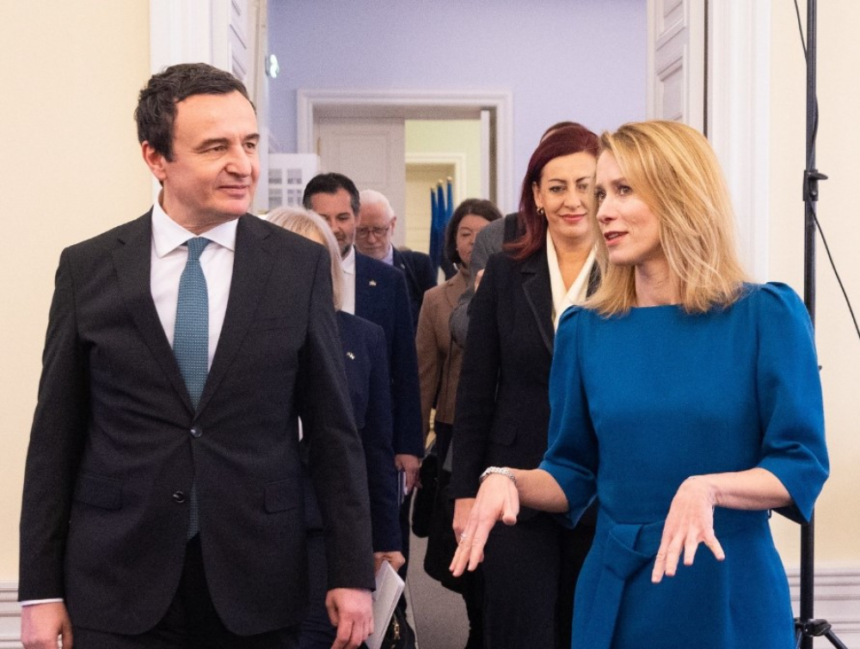Kosovo’s Prime Minister Albin Kurti and Serbia’s President Aleksandar Vučić are set to hold separate meetings with the European Union’s High Representative for Foreign Affairs and Security Policy, Kaja Kallas, on December 3, as part of a non-formal dinner with the leaders of six Western Balkan countries. These talks come amid heightened tensions following the recent attack on the Ibër-Lepenc canal in northern Kosovo, an event that has further strained the already fragile relations between Kosovo and Serbia.
Anitta Hipper, a spokesperson for the European Commission, clarified that the meeting would not be part of the ongoing dialogue aimed at normalizing relations between Kosovo and Serbia. Instead, it will be a broader discussion with the leaders of the Western Balkans. Hipper stressed that Kallas’s focus will be on fostering diplomatic relations in the region during a period marked by political transition and growing global challenges.
The Ibër-Lepenc Canal Attack: A New Flashpoint in Kosovo-Serbia Tensions
The Ibër-Lepenc canal attack, which occurred in the village of Varragë in Zubin Potok, northern Kosovo, has been described by Kosovo authorities as the most significant assault on the country’s critical infrastructure since the end of the war. Kosovo has accused Serbia of orchestrating the attack, a claim that Serbia has firmly denied. While Kosovo insists it has sufficient evidence linking Serbia to the attack, Serbia maintains that such allegations are baseless.
This attack, coupled with previous incidents like last year’s deadly attack by Serbian paramilitaries in Banjskë, Zveçan, has exacerbated tensions in the region. The Kosovo authorities view these attacks as direct threats to regional stability, and they have called for the immediate prosecution of those responsible.
Kaja Kallas’ Role Amid Regional Challenges
Kaja Kallas begins her mandate in a highly charged environment, with the recent attack in northern Kosovo casting a shadow over her initial diplomatic efforts. As the EU’s High Representative for Foreign Affairs, Kallas faces the delicate task of managing relations between Kosovo and Serbia, two countries with a complex and often contentious history. Her mandate comes at a critical time for the Western Balkans, as the region grapples with numerous challenges, including security concerns, unresolved political disputes, and the ongoing fallout from Russia’s war in Ukraine.
Kallas inherits the legacy of her predecessor, Josep Borrell, who was instrumental in shaping the EU’s approach to the Kosovo-Serbia dialogue. The legacy of Borrell’s diplomatic efforts, including the Brussels Agreement and the Ohrid Annex, is significant, but many of these agreements have yet to be fully implemented. The continued deadlock in the normalization process remains a major obstacle to achieving lasting peace in the region.
EU’s Commitment to Regional Stability and Kosovo-Serbia Dialogue
While Kosovo and Serbia reached a “historic agreement” in early 2023, first in Brussels and later in Ohrid, the agreements have not yet been implemented, and tensions continue to flare up. Despite European diplomats insisting that the Brussels Agreement and the Ohrid Annex are legally binding, the lack of progress has left the region on edge. This ongoing impasse is further complicated by the recent attack in Zubin Potok, which underscores the risks of further escalation.
Kallas will have to navigate these challenges as she seeks to uphold the EU’s commitment to regional stability while addressing the growing security concerns in the Western Balkans. Her leadership will be critical in shaping the EU’s response to these crises, ensuring that dialogue continues even amid significant setbacks.
Conclusion: A Critical Moment for EU Diplomacy in the Western Balkans
Kaja Kallas’s meeting with Albin Kurti and Aleksandar Vučić marks a pivotal moment in EU diplomacy for the Western Balkans. With tensions rising and challenges mounting, the EU’s ability to mediate and facilitate dialogue will be tested. As Kosovo and Serbia remain at an impasse, the EU’s role in preventing further violence and ensuring regional peace will remain crucial in the coming years.







